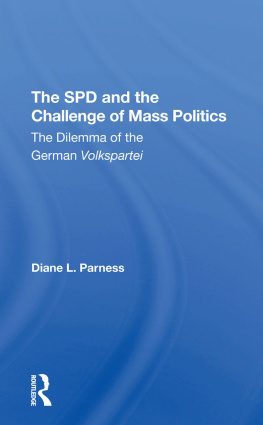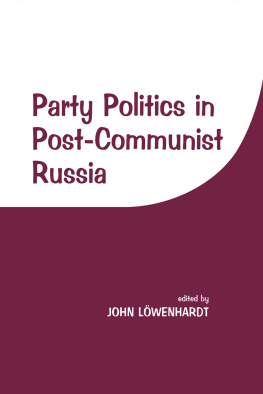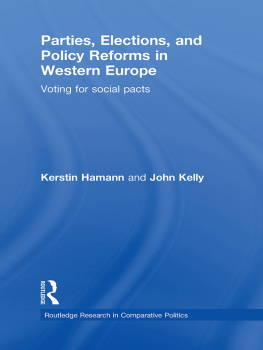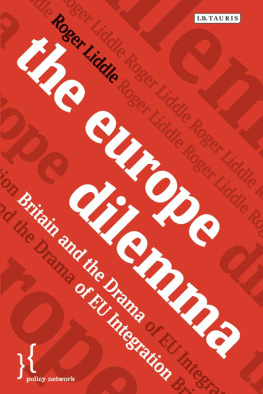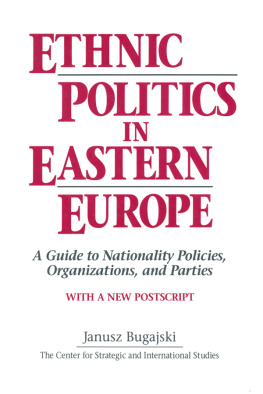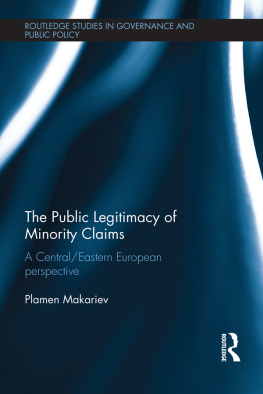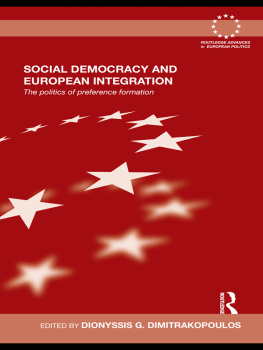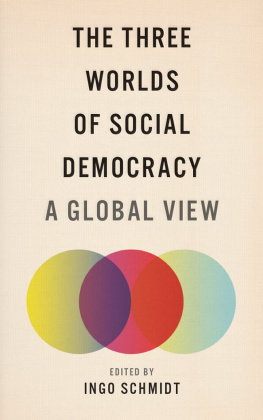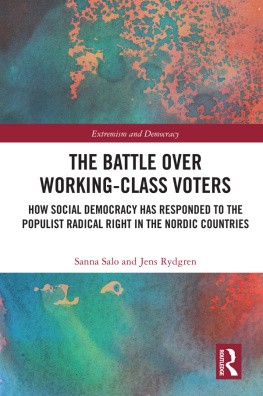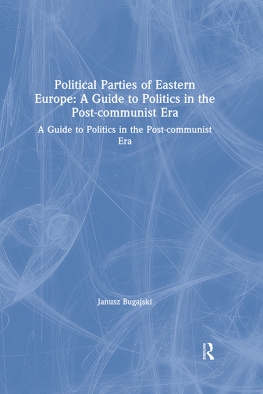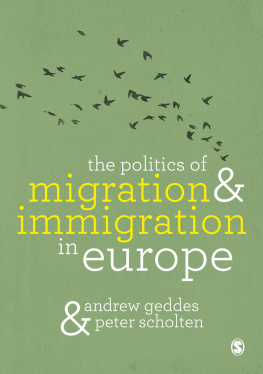The SPD and the Challenge of Mass Politics
The SPD and the Challenge of Mass Politics
The Dilemma of the German Volkspartei
Diane L. Parness
First published 1991 by Westview Press, Inc.
Published 2019 by Routledge
52 Vanderbilt Avenue, New York, NY 10017
2 Park Square, Milton Park, Abingdon, Oxon OX14 4RN
Routledge is an imprint of the Taylor & Francis Group, an informa business
Copyright 1991 Taylor & Francis
All rights reserved. No part of this book may be reprinted or reproduced or utilised in any form or by any electronic, mechanical, or other means, now known or hereafter invented, including photocopying and recording, or in any information storage or retrieval system, without permission in writing from the publishers.
Notice:
Product or corporate names may be trademarks or registered trademarks, and are used only for identification and explanation without intent to infringe.
Library of Congress Cataloging-in-Publication Data
Parness, Diane L., 1955
The SPD and the challenge of mass politics : the dilemma of the German Volkspartei/Diane L. Parness.
p.cm.(Westview special studies in West European politics and society)
Includes bibliographical references and index.
ISBN 0-8133-7997-0
1. Sozialdemokratische Partei Deutschlands. 2. Germany (West) Politics and government1982- . I. Title. II. Series.
JN3971.A98S6169 1991
324.243'072dc20
90-23122
CIP
ISBN 13: 978-0-367-29625-4 (hbk)
The challenges facing the leadership of the Social Democratic Party of Germany (the SPD) in a new decade promise to be even more formidable than those that the party confronted in the eighties. Reunification offers a glittering prize to the party that can rise to the challenge of carving a large niche in an expanded German electorate, but building and sustaining the favor of a winning electoral coalition could be at least as difficult in a united Germany as it was in the Federal Republic.
Regardless of the course reunification may follow, the conflict and dilemma at the heart of this study will continue to vex the policy decisions of SPD elites and influence the choices of German voters. Any appeal to a newly enlarged sector of working-class voters must still be counterbalanced by a strong presence in the growing ranks of salaried middle-class employees. It is by no means certain that East German workers will provide a reliable constituency for the SPD, and the gradual merger of the East and West German economies will produce a larger service sector, with a correspondingly larger segment of voters with no ties to the traditional pillars of support for political parties.
The bleaker side of reunification portends unprecedented strain on the economy at the same time frightening levels of industrial pollution in the east will exacerbate Germany's environmental problems. If anything, the ramifications of reunification suggest that the ongoing confrontation between economic interests and environmental prerogatives will be aggravated, not alleviated.
In the past the SPD has found itself wedged between the Christian Democratic Union's (CDU's) advocacy of economic development and the Greens' dedication to environmental health. In trying to appeal to both a working-class and center-left constituency, the SPD has been torn repeatedly by conflicting interests, and the party's capacity to mount comprehensive and innovative programs has suffered accordingly. As a result, its leaders have resorted to a defensive posture, pointing out flaws in the programs and policies devised by others.
The SPD's prospects for the coming decade are hardly dim, but its fortunes will depend on the party's ability to make the most of its strengths. As it has in the past, the SPD will focus its effort to rebuild and rejuvenate at the local and Land levels. A renewed emphasis on the primacy of party organization and responsiveness to its membership could do much to rekindle the popular enthusiasm and support that translates into success at the national level. Land governments will also continue to nurture the political skills and popularity of the party's elites.
The finest features of the SPD's experience in Hesse demonstrate that the party can articulate moderate and innovative programs of economic development and environmental responsibility that still complement the SPD's traditional emphasis on social welfare. It very likely will be the party's commitment to social welfare concerns in difficult economic circumstances that will define its policy stance as reunification proceeds. The SPD's ability to construct a policy platform that resolves these potential conflicts will affect in large part its electoral success.
These same issues have been at the heart of the SPD s struggle over the past decade and played prominently in its effort to govern in tandem with the Greens in Hesse. The same basic questions that have shaped the SPD's development since Bad Godesberg are not likely to change, regardless of the new contours of politics in a reunified Germany. In essence, the SPD will not soon escape the dilemma of the Volkspartei.
Diane L. Parness
The author wishes to thank the Thyssen Foundation for its generous support in funding the research for this study. Many people in the Federal Republic contributed graciously to this book, but the following scholars and public officials were particularly generous in sharing their insight on the SPD: Susanne Miller, Richard Loewenthal, Kurt Sontheimer, Gesinne Schwann, Karsten Voight, and Frank Beucker.
All errors and shortcomings in this book are entirely my responsibility, but any credit for its analytical content must be shared with Professor Karl Cerny of Georgetown University. It was my very good fortune to have a mentor with such exacting standards of scholarship.
Finally, for his unending support, patience, and boundless supply of Hungarian one-liners, I thank my husband, Professor Andrew Gyorgy. I have yet to meet a better teacher.
D.L.P.
1
The Dilemma of the Volkspartei
In an era of much debate over the decline of political parties, the SPD is a glaring example of a party that has seen much better times and does not know how to recall them. These are not sudden symptoms of a creeping sickness in Europe's oldest socialist party. They are the manifestations of a full-blown disease that has its roots in the conscious transformation introduced by SPD elites during the mid-sixties.
Several recent analyses of the SPD's persistent difficulties draw broad lines of comparison between Germany's Social Democrats and kindred parties in other postindustrial nations, implying that such parties are inevitable casualties of postwar economic, social, and/or political developments. This study will suggest that such analyses typically hamper their explanatory power by emphasizing broad-scale phenomena that can be observed cross-nationally. In the interest of defining a trend or trends that can be applied to several nations, the authors of these studies neglect the particular circumstances that account for a single party's changing fortunes in its own sphere of influence. As a result, such studies are distorted by the authors' tendency to ignore national or sub-national idiosyncracies in order to identify cross-national tendencies as causal variables.
Over the next four chapters the genesis and development of the SPD's current malaise will be uncovered. In this process, the party will not be treated solely as a dependent variable, afflicted by the new agenda and political style of what sociologists and political scientists have tabbed the "postmaterialist era."

